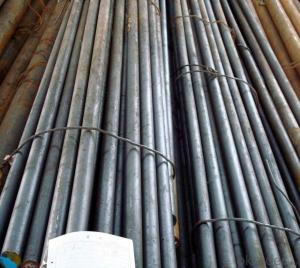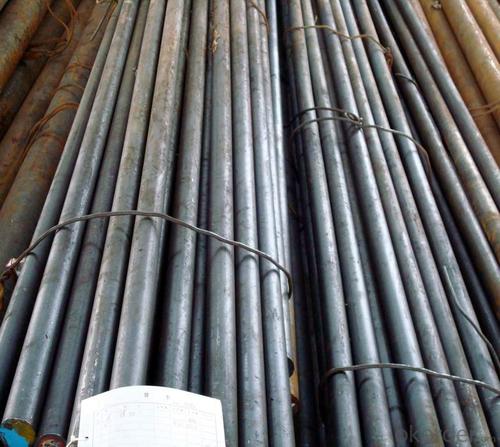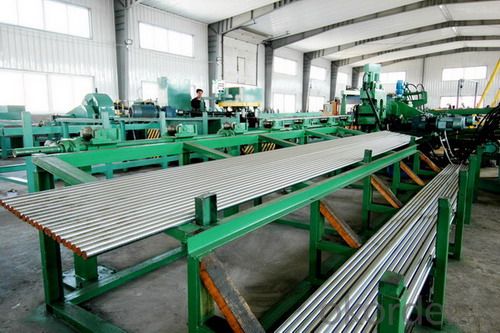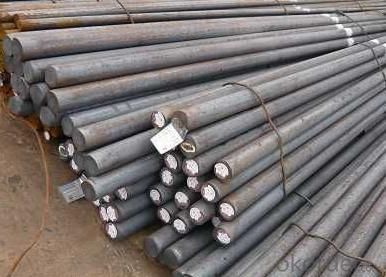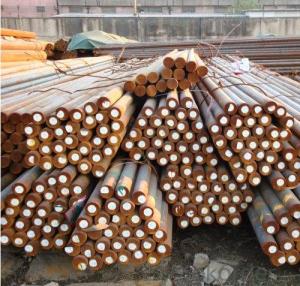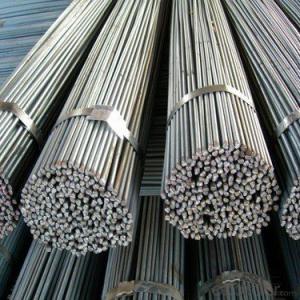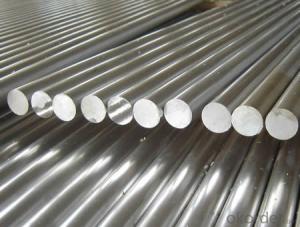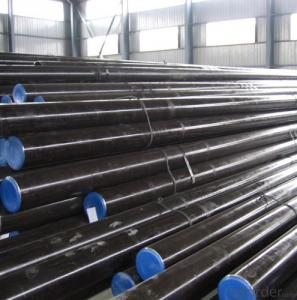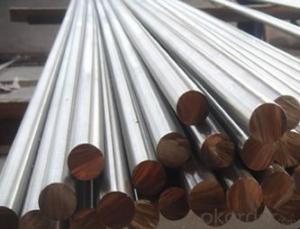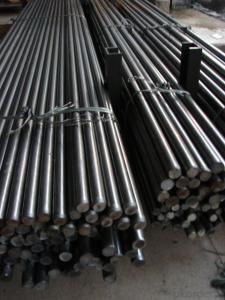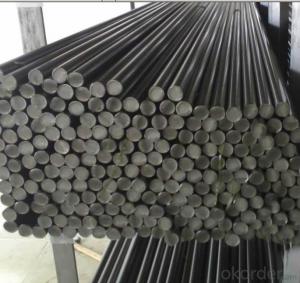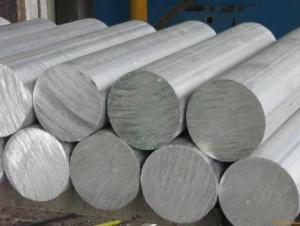High Quality Spring Steel Round Bar 8-10mm
- Loading Port:
- China main port
- Payment Terms:
- TT or LC
- Min Order Qty:
- 100 m.t
- Supply Capability:
- 10000 m.t/month
OKorder Service Pledge
OKorder Financial Service
You Might Also Like
High Quality Spring Steel Round Bar 8-10mm
Product Description:
Spring Steel can be divided into two types. One is carbon spring steel, and other one is alloy spring steel.
Alloy spring steel is based on carbon spring steel, by adding one or more alloying elements to improve the mechanical properties, hardenability and other properties to meet the requirement for manufacture all kinds of spring steel.
Specification of High Quality Spring Steel Round Bar 8-10mm:
-Material: 1065
-Standard: ASTM
-Production: Hot rolled or cold rolled
-Type: Spring Steel
| Diameter(mm) | Mass(kg/m) | Section(mm2) |
| 8 | 0.395 | 50.24 |
| 9 | 0.499 | 63.585 |
| 10 | 0.617 | 78.5 |
Corresponding Steel Grade of High Quality Spring Steel Round Bar 8-10mm for Reference:
USA, ASTM | CHN, GB/T | JPN, JIS | ISO |
1065 | 65 | SWRH67A SWRH67B | Type SC Type DC |
FRA, NF | GBR, BS | ||
C66D | C66D |
Chemical Composition of High Quality Spring Steel Round Bar 8-10mm:
C | Mn | Ni | Si |
0.62~0.70 | 0.50~0.80 | ≤0.30 | 0.17~0.37 |
P | S | Cr | Cu |
≤0.035 | ≤0.035 | ≤0.25 | ≤0.25 |
Mechanical Properties of High Quality Spring Steel Round Bar 8-10mm:
-Tensile Strength σb (MPa): ≥695
-Yield Strength σs (MPa): ≥410
-Elongation δ10(%): ≥10
-Percentage reduction of area: ψ (%): ≥30
-Hardness HBS, no heat treatment: ≤255
Usage/Applications of High Quality Spring Steel Round Bar 8-10mm:
-ASTM1065, is medium-high carbon spring steel. After heat treatment, this type of steel obtains high strength, hardness and elasticity but this material isn’t perfect for welding.
-Its fatigue strength is equal to alloy spring steel when they are in same configuration.
-For manufacturing spring, spring circle, all kinds of grommet, clutch, and axels in the production of normal machine.
Packaging & Delivery of High Quality Spring Steel Round Bar 8-10mm:
-Packing Detail: The products can be packed in bundles by steel wires.
-Marks: There are two types of marks. One is color mark and other one is tag mark. We paint color marks on both ends of bundles to make sure that it’s more convenient for customers to distinguish their products from other products at the destination port. The tag marks will be tied up to each bundle to make sure that customers know the specifications of each bundle like product’s name and size and other information of products.
-Delivery Detail:
1, Delivery time: 30~60 working days after receive buyer’s T.T. or L/C.
2, Delivery status should be written in the contract. (Heat treatment or no)
FAQ:
Q1: Why buy Materials & Equipment from OKorder.com?
A1: All products offered byOKorder.com are carefully selected from China's most reliable manufacturing enterprises. Through its ISO certifications, OKorder.com adheres to the highest standards and a commitment to supply chain safety and customer satisfaction.
Q2: How do we guarantee the quality of our products?
A2: We have established an advanced quality management system which conducts strict quality tests at every step, from raw materials to the final product. At the same time, we provide extensive follow-up service assurances as required.
Q3: How soon can we receive the product after purchase?
A3: Within three days of placing an order, we will arrange production. The shipping date is dependent upon the quatity, how many sizes you want and the plan of production, but is typically 1 month to 2 month days from the beginning of production.
Images of High Quality Spring Steel Round Bar 8-10mm:
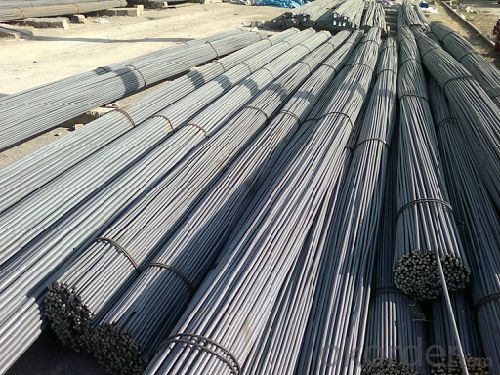
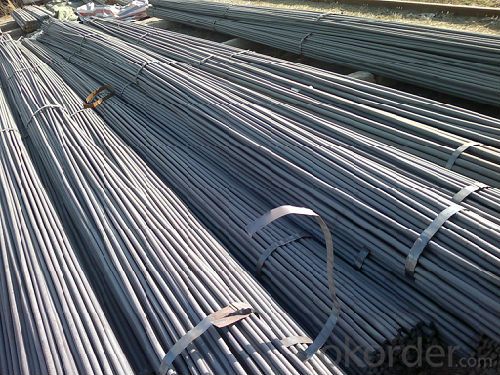
*If you would like to get our price, please inform us the size, standard/material and quantity. Thank you very much for your attention.
- Q: What are the different cutting tools used for machining special steel?
- Some different cutting tools used for machining special steel include carbide inserts, high-speed steel (HSS) end mills, diamond-coated tools, and ceramic cutting tools. These tools are designed to withstand the high hardness and heat resistance of special steels, ensuring precise and efficient cutting operations.
- Q: How does special steel perform in extreme weather conditions?
- Special steel is specifically designed to have enhanced performance in extreme weather conditions. It exhibits exceptional strength, durability, and resistance to corrosion, making it highly suitable for withstanding harsh environments such as extreme heat, cold, humidity, and strong winds. Additionally, special steel maintains its mechanical properties and structural integrity even under extreme temperature variations, ensuring its reliability and longevity in adverse weather conditions.
- Q: How is special steel used in the production of turbine blades?
- Special steel is used in the production of turbine blades due to its exceptional strength, heat resistance, and corrosion resistance properties. This high-quality steel allows turbine blades to withstand the extreme conditions within a turbine, including high temperatures and rotational speeds. Additionally, the unique composition of special steel enables the blades to maintain their shape and structural integrity, ensuring optimal performance and longevity in power generation applications.
- Q: Is special steel suitable for manufacturing precision components?
- Yes, special steel is highly suitable for manufacturing precision components. Special steel is a type of steel that is specifically engineered to possess exceptional properties, such as high strength, hardness, and resistance to wear, corrosion, and heat. These characteristics make it an ideal choice for manufacturing precision components that require tight tolerances, accuracy, and reliability. The inherent strength and hardness of special steel allow for the production of durable and long-lasting precision components. This is particularly important in industries where components are subjected to high stress and heavy loads, such as aerospace, automotive, and machinery manufacturing. Special steel's resistance to wear and corrosion ensures that the precision components can withstand harsh operating environments and maintain their functionality over time. Furthermore, special steel's excellent heat resistance makes it suitable for precision components that are exposed to elevated temperatures. This is especially relevant in industries like aerospace and power generation, where components need to withstand extreme heat without compromising their performance. Special steel also offers excellent machinability, which is crucial for manufacturing precision components with intricate designs and complex geometries. It can be easily shaped, cut, and formed into various shapes and sizes, allowing for the production of intricate and precise components. Overall, the unique properties of special steel, including high strength, hardness, resistance to wear, corrosion, and heat, as well as excellent machinability, make it highly suitable for manufacturing precision components. Its use ensures the production of high-quality components that meet the strict requirements of precision applications.
- Q: What are the main characteristics of corrosion-resistant steel?
- Corrosion-resistant steel, also known as stainless steel, is a type of steel alloy that possesses unique characteristics that make it highly resistant to corrosion. Here are the main characteristics of corrosion-resistant steel: 1. High resistance to corrosion: One of the primary characteristics of corrosion-resistant steel is its ability to resist corrosion. This is achieved through the addition of specific alloying elements, such as chromium, nickel, and molybdenum, which form a protective layer on the surface of the steel. This protective layer, known as the passive layer, prevents the underlying steel from coming into contact with corrosive substances, such as moisture, chemicals, and acids. 2. Excellent durability: Corrosion-resistant steel exhibits exceptional durability, making it suitable for various applications in harsh environments. It can withstand exposure to extreme temperatures, high humidity levels, and corrosive chemicals without deteriorating or losing its structural integrity. This durability ensures that structures made from corrosion-resistant steel have a long service life, reducing the need for frequent maintenance and replacements. 3. Aesthetic appeal: In addition to its functional properties, corrosion-resistant steel also offers aesthetic appeal. Its smooth and polished surface gives it a visually pleasing appearance, making it a popular choice for architectural applications, interior design, and decorative elements. The ability to maintain its appearance over time, without rusting or discoloration, adds to its desirability in both industrial and domestic settings. 4. High strength: Corrosion-resistant steel is known for its high strength and toughness. It retains its mechanical properties even in corrosive environments, allowing it to withstand heavy loads, impacts, and other external forces. This strength makes it suitable for applications where structural integrity and safety are crucial, such as bridges, buildings, marine equipment, and automotive components. 5. Versatility: Corrosion-resistant steel offers versatility in terms of its applications. It can be easily fabricated, welded, machined, and formed into various shapes and sizes, allowing for customization and adaptability. This versatility makes it ideal for a wide range of industries, including construction, aerospace, automotive, chemical processing, and marine. 6. Hygienic properties: Another important characteristic of corrosion-resistant steel is its hygienic properties. Its non-porous surface prevents the growth of bacteria, making it suitable for applications in the food and beverage industry, healthcare facilities, and pharmaceutical manufacturing. The ease of cleaning and maintenance further enhances its hygiene standards. Overall, corrosion-resistant steel combines excellent resistance to corrosion with durability, strength, versatility, and aesthetic appeal. These characteristics make it a reliable and cost-effective material for various industries, ensuring long-term performance and protection against the damaging effects of corrosion.
- Q: What are the main applications of special steel in the chemical processing industry?
- Special steel is widely used in the chemical processing industry due to its unique properties and capabilities. Some of the main applications of special steel in this industry include the manufacturing of storage tanks, pipelines, and reactors. Special steel is resistant to corrosion, high temperatures, and chemical reactions, making it ideal for handling and storing various chemicals and substances. Additionally, special steel is also utilized in the construction of equipment used in the separation, purification, and filtration processes in chemical plants. Overall, the main applications of special steel in the chemical processing industry revolve around its durability, resistance to corrosion, and ability to withstand harsh chemical environments.
- Q: How does special steel contribute to the manufacturing of surgical instruments?
- Special steel, which is also known as stainless steel, plays a vital role in the production of surgical instruments. Its exceptional properties make it an ideal material for manufacturing high-quality surgical instruments used in various medical procedures. To begin with, special steel exhibits a high resistance to corrosion and rust. Surgical instruments are constantly exposed to bodily fluids, sterilization processes, and harsh cleaning agents. The corrosion resistance of special steel guarantees the durability of these instruments, enabling them to withstand repeated use and cleaning without compromising their integrity. Furthermore, special steel possesses excellent strength and hardness characteristics. Surgical instruments must be robust and capable of withstanding the forces and pressures exerted during surgeries. The high strength and hardness of special steel ensure that these instruments retain their shape and sharpness even after multiple uses, minimizing the risk of breakage or deformation during critical procedures. Moreover, special steel is biocompatible, meaning it does not elicit reactions or complications when in contact with bodily tissues or fluids. This is particularly important for surgical instruments that come into direct contact with patients' bodies. The biocompatibility of special steel guarantees that there are no adverse reactions or complications when these instruments are used in surgeries, thereby reducing the risk of infections or other complications. In addition, special steel is highly machinable and can be easily molded into intricate shapes and designs. Surgical instruments require precision and accuracy to effectively fulfill their intended functions. The machinability of special steel allows manufacturers to create complex instruments with fine details and features, ensuring their optimal performance during surgical procedures. Furthermore, special steel can be efficiently sterilized. Sterilization is a critical step in ensuring the safety and effectiveness of surgical instruments. Special steel's ability to withstand high temperatures and various sterilization methods, such as autoclaving or ethylene oxide gas sterilization, makes it an ideal choice of material for surgical instruments. In conclusion, special steel significantly contributes to the manufacturing of surgical instruments due to its corrosion resistance, strength, biocompatibility, machinability, and sterilization capabilities. These properties guarantee that surgical instruments made from special steel are durable, reliable, safe, and effective in medical procedures, ultimately enhancing the success of surgeries and improving patient outcomes.
- Q: What are the different casting grades of special steel?
- The different casting grades of special steel include low alloy steel, high alloy steel, stainless steel, tool steel, and heat-resistant steel.
- Q: What are the characteristics of tool steel?
- Tool steel is a type of steel that possesses several distinctive characteristics. Firstly, it is known for its exceptional hardness, making it highly resistant to wear and abrasion. Additionally, tool steel has excellent toughness and strength, allowing it to withstand high impact forces without fracturing. It also exhibits good heat resistance, retaining its hardness and strength even at elevated temperatures. Another notable characteristic of tool steel is its ability to be easily shaped and machined, making it a preferred choice for manufacturing tools and equipment. Overall, the key attributes of tool steel include hardness, toughness, strength, heat resistance, and machinability.
- Q: How is special steel used in the production of bearings for high-speed applications?
- Due to its unique properties, special steel is widely utilized in the manufacturing of bearings for high-speed applications. These bearings play a critical role in facilitating efficient movement between surfaces and must withstand extreme forces and rotational speeds. To meet these demanding requirements, special steel is selected for its remarkable strength, durability, and resistance to wear. The composition of special steel enables it to maintain its structural integrity under heavy loads, preventing deformation and ensuring the longevity of the bearing. Moreover, special steel possesses exceptional hardness and toughness, making it resistant to wear and fatigue caused by repetitive high-speed rotations. This characteristic is particularly important in high-speed applications where continuous motion generates significant heat and friction, leading to premature wear and failure of the bearing. By utilizing special steel, these issues are minimized, guaranteeing reliable and efficient performance. Additionally, special steel exhibits superior heat resistance, which is crucial in high-speed applications where temperatures can escalate due to friction and high rotational speeds. The ability of special steel to withstand elevated temperatures without compromising its mechanical properties or deforming is vital for preventing premature bearing failure and ensuring long-term performance. In conclusion, special steel is an indispensable material in the production of bearings for high-speed applications. Its exceptional strength, durability, wear resistance, and heat resistance enable bearings to operate reliably and efficiently under extreme conditions, ensuring smooth movement and reducing the risk of premature failure.
Send your message to us
High Quality Spring Steel Round Bar 8-10mm
- Loading Port:
- China main port
- Payment Terms:
- TT or LC
- Min Order Qty:
- 100 m.t
- Supply Capability:
- 10000 m.t/month
OKorder Service Pledge
OKorder Financial Service
Similar products
Hot products
Hot Searches
Related keywords
